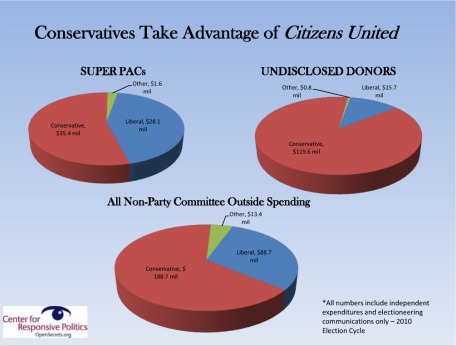The Center for Responsive Politics recently published an analysis of the effects of last year’s Citizens United Supreme Court decision (which, as the Center summarizes, “allowed corporations and unions to use their general treasuries to pay for political advertisements that expressly call for the election or defeat of a candidate, also known as independent expenditures”). The conclusion: Citizens United “profoundly affects [the] political landscape.”
How so? Well, for one: “The percentage of spending coming from groups that do not disclose their donors has risen from 1 percent to 47 percent since the 2006 midterm elections.” And while the entire slideshow, posted at the end of this post, is well worth a look, slide twelve of twelve, below, paints a vivid picture:

Expect to see more blue in the 2012 versions of these pie charts since, as Roll Call put it in a headline today, “Democrats Raising Money They Oppose.” Say what, you say? Roll Call explains:
Democrats have railed for more than a year against the landmark Supreme Court decision that unleashed unlimited and undisclosed corporate and union dollars in political campaigns, but now they’re preparing to collect and spend this same money.
Democratic operatives are racing to organize new groups to solicit and spend millions of dollars that the Citizens United ruling allowed, gearing up to play by the same rules as Republicans regardless of whether they like those rules.
They all insist that they don’t. But after watching Republicans take advantage of the new rules to spend unprecedented volumes of cash and win House and Senate seats across the map in the 2010 midterm elections, they say they can no longer stand back on moral grounds.
Hence, the formation of–to cite two of a few fledgling fundraising groups on the left–Priorities USA and Priorities USA Action, which, Roll Call writes, are
designed to mirror the operation spearheaded by Republican strategist Karl Rove, who in 2010 revolutionized a two-pronged fundraising approach to raise and spend as much money as possible: Crossroads GPS, a 501(c)(4) nonprofit that can raise unlimited money without having to disclose the names of donors [like Priorities USA], and American Crossroads, a post-Citizens United breed of political action committee called a “super PAC” that can spend unlimited independent expenditures for or against candidates [like Priorities USA Action].
(Noted: The Huffington Post’s re-run of an AP report on Priorities is headlined “Priorities USA, Outside Fundraising Group, Launched by Democrats” and features a huge photo of “Democrats” Karl Rove.)
Politico was first with the details back on April 29th, the day Priorities officially announced itself, reporting that Priorities’ “leadership team includes [Bill] Burton, a former deputy [Obama] White House press secretary; Sean Sweeney, who was a senior adviser to former White House chief of staff Rahm Emanuel, and former Clinton political strategist Paul Begala.” And the initial funders?
Among the group’s first supporters are Ellen Malcolm, the wealthy founder of the pro-abortion rights group Emily’s List; Harold Ickes, a former Clinton adviser; Jon Youngdahl, a Service Employees International Union political strategist.
They also include Jay Dunn, a longtime party fundraiser; Greg Speed, a longtime progressive advocate and media consultant; and Rob McKay, a major Democratic donor who is head of the McKay Family Foundation.
The influential SEIU, one of the nation’s largest labor unions, also is among the first donors to the joint effort.
Hollywood producer Jeffrey Katzenberg donated to the effort and has agreed to help raise money for the committees.
The New York Times chimed in on A-1 (beneath the headline, “Now, Liberals Offer Donors A Cash Cloak”) that Priorities’ “entree into the early 2012 contest all but ensures that the presidential race will be awash in cash from undisclosed corporate and labor sources with huge stakes in Washington policy making.”
Democrats are, said The New York Times‘s editorial page on Saturday, being “seduced by secret money.” From that editorial:
A political system built on secret, laundered money will inevitably lead toward an increased culture of influence and corruption. Democrats would attract more support as a principled party that refused to follow the Republicans down that dark alley.
MSNBC, in its report on the Priorities groups (which ran with the headline, emphasis mine, “Democrats opt for pragmatism on secret donors”), identified one of the dangers awaiting–along with the cash–down that “dark alley:”
[I]s there a danger that once Democratic donors become accustomed to using Burton-type groups, that they might find that the system works well for their purposes?
Stay tuned.
Here’s that Center for Responsive Politics slideshow, in full:
Effects of the Citizens United v. Federal Election Commission
Liz Cox Barrett is a writer at CJR.
